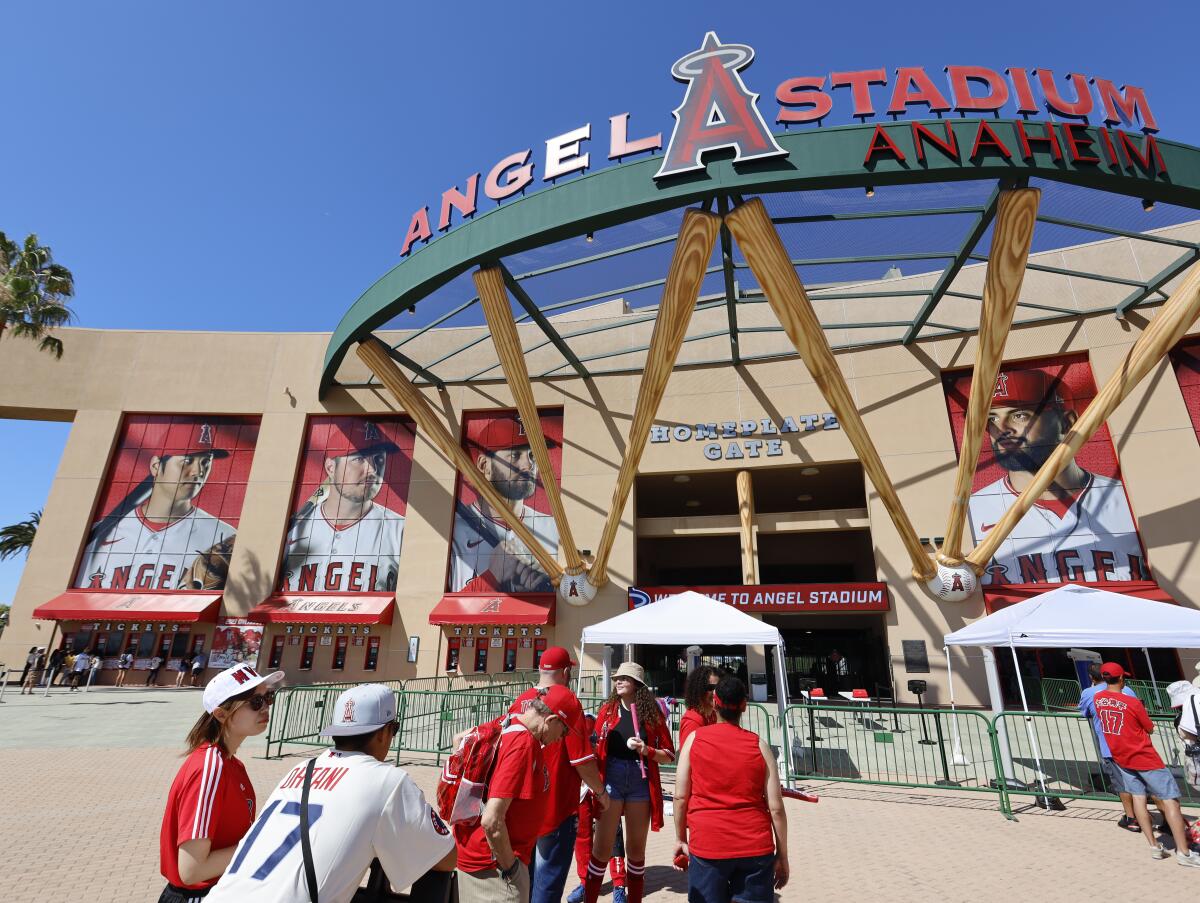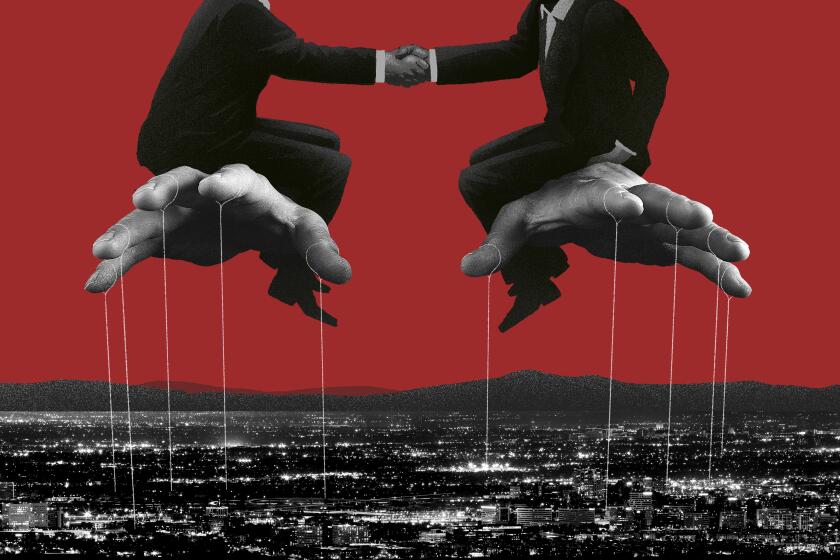New documents reveal how the Angels tried to pull the strings at Anaheim City Hall

- Share via
The directions from a consultant representing the Angels were clear and went to some of the most influential leaders in Anaheim City Hall.
They outlined the agenda for a mock City Council meeting to rehearse how the mayor and two council members would push forward the controversial sale of Angel Stadium from the city to a company controlled by the owner of the Major League Baseball team.
The mayor would play himself at the mock council meeting, according to the emailed directions, and be “a strong defender of the deal.” The focus for the mayor pro tem included “Angels charity” and “Anaheim History.” A second City Council member was expected to tout “Economic Development & Jobs” and attack a council member who had questioned the deal.
“Participants will be asked to study their roles and come prepared … to be at the top of their game,” the email sent in September 2020 said. “[Angels] team available to help develop ‘zingers’, responses, and other points to improve performance.”
The emailed directions emerged Wednesday as part of former Anaheim Mayor Harry Sidhu’s agreement to plead guilty in U.S. District Court in Santa Ana to crimes stemming from the now-aborted stadium deal. The Angels haven’t been accused of wrongdoing.
Sidhu admitted obstructing the federal investigation by deleting the emailed directions and lying to the FBI when he said he didn’t expect anything from the Angels in return for pushing through the stadium sale. Secret recordings captured him saying he hoped to secure a $1-million campaign contribution from the team, according to the plea agreement.
Interviews and records provide a rare insider’s look at the influence of unelected power brokers in the city that is home to Disneyland and the Angels.
Since the FBI’s public corruption investigation became public last year, Anaheim — home to Disneyland, the self-described “Happiest Place on Earth” — has been roiled by accounts of how a small group of unelected powerbrokers steered Anaheim City Hall. One member described the group in a wiretapped conversation as a “cabal.” They scripted public remarks by Sidhu. They had unusually close friendships with city officials. They held a discreet retreat at a luxury hotel.
But the granular detail in the direction-laden email provides the most jarring example yet of how monied interests influenced how the city was run, to the point of planning to orchestrate and rehearse the minutiae of an upcoming City Council meeting with elected officials.
Jodi Balma, a political science professor at Fullerton College, said the mock council meeting plan represented a pervasive level of corruption at City Hall and showed that some council members had been merely performing “a pageant” when they met in public.
“It’s all role-playing to them because the real power centers where decisions were made were behind closed doors,” she said, adding that she questioned whether the city could enact meaningful reforms since some of the same city officials from that period remain.
Jose Moreno, who served on the council at the time of the email and was sharply critical of the stadium deal, said council meetings often had an eerie feeling of being scripted or orchestrated. He called for any city official involved in the scheduled mock meeting — the plea agreement doesn’t make clear if it actually took place — to resign or be placed on administrative leave.
“They prepared and conspired to undermine democracy,” he said “At some point you have to clean house.”
The level of detail in the email, Moreno added, reflects the “arrogance and brazen control that [the Angels] held over elected officials in Anaheim.”
The city council voted to kill the $320-million stadium sale last year — Sidhu was the city’s lead negotiator with the Angels — after the FBI investigation burst into public view and Sidhu resigned. In a letter sent to the city soon after the sale collapsed, an Angels attorney described the deal as “the result of an honest arms-length negotiation.”
An Angels spokeswoman declined to comment for this story. She referred to a statement made Wednesday that the plea agreement and a city-commissioned investigation made public last month “showed no evidence of any wrongdoing by the Angels Organization.” The city-commissioned investigation’s final report said that the Angels and Disney — two powerful Anaheim institutions — “flatly refused to cooperate at all.”
Mayor Ashleigh Aitken, a former federal prosecutor who won election last year as a reformer, said what she read in the plea agreement was “disturbing” and left her wanting to know if state transparency laws were violated “to force a sham sale of the stadium.”
“How much did high-level city officials know about the former mayor and the Angels’ plans to put on a dog and pony show that would lead to the sale of our largest city asset?” she asked.
Aitken said any city staff or council members who “facilitated or participated in” the mock City Council meeting should resign.
The plea agreement doesn’t name the Angels consultant who sent the plans about the mock council meetings, but details in the agreement and an FBI affidavit filed last year match prominent local lobbyist Jeff Flint.
Anaheim lobbying records have one entry for Flint’s work on behalf of the Angels-linked company on Sept. 21, 2022 — the date the mock city council meeting had been scheduled to take place. The entry said Flint had a call with Sidhu and City Manager James Vanderpool to “discuss status of preparation of documents for City Council Meeting.”
The ‘cabal’ steered policy, received contracts from the city and scripted remarks by Anaheim’s mayor, a Times investigation found.
According to Sidhu’s plea agreement, Flint sent more than eight people the email with the title “Angels Deal Debate/Council Prep — ROUND 1.” The attached directions called for three separate sessions as preparation for the real council meeting where the deal was to be approved.
The first session would involve a mock council meeting “to identify pitfalls and areas of vulnerability.” That would be followed by a debrief and making “notes for areas of strength, vulnerability, and areas needed for improvement.”
On the day of the real council meeting, the group would meet again to “do a quick run through as time permits, focusing on key moments as needed.”
The document referred to Moreno, the council’s main critic of the stadium sale, in laying out the expectations for one of the council members invited to the mock meeting: “Attack Moreno on Vulnerabilities.”
Flint’s directions went to the personal email addresses of Sidhu, who later falsely told FBI agents he didn’t use his personal email to conduct city business; the mayor pro tem at the time, Stephen Faessel; and a second unidentified member of the council, who was expected to attack Moreno.
Former Councilman Trevor O’Neil this week identified himself as the anonymous council member in a statement to The Times. The statement said that although “the email referenced in the plea agreement proposed a mock council meeting, we did not do that, and instead, we simply had a discussion of items and policy.” O’Neil insisted the discussion complied with the Brown Act, the state’s public meetings law, and denied being coached on talking points.
“The statements I made during council meetings were always my own, developed during the meetings based on the dialogue at the time, and never rehearsed,” he said.
Flint’s email also went to the personal addresses of the city’s chief communications officer, Michael Lyster, along with a second city employee whose position isn’t specified in the plea agreement.
Flint and Faessel didn’t respond to requests for comment. Lyster said Anaheim had no additional comment beyond a two-sentence statement issued Wednesday. He didn’t answer direct questions about his receipt of the email.
The Angels president received the email along with a senior vice president for the team, according to the plea agreement. So did Todd Ament, then-Anaheim Chamber of Commerce president, and others who aren’t identified in the court document.
Ament, who the FBI alleged was a ringleader along with Flint of a “covert group that appeared to exert significant influence over the City of Anaheim,” agreed to cooperate with the government and pleaded guilty to four felonies last year.
Another council member at the time, Lucille Kring, expressed bafflement this week at the idea of a mock City Council meeting.
“I was surprised because it was so unnecessary,” she said. “The stadium deal had already been decided.”
The plea agreement’s details echo other revelations about how special interests pulled the strings at City Hall.
The city-commissioned investigation discovered a draft statement prepared for Sidhu in January 2019 about the Angels receiving a one-year lease extension. Metadata showed the creator: Flint.
Sidhu touted his work with the Angels during his State of the City luncheon speech in March 2019: “I reached out to the team’s owner … to see what we could do to keep the team here, unlock the potential of the land around the stadium and craft a plan that benefits our city and our residents.”
The metadata from a PDF of the speech text uploaded to Anaheim’s website listed the creator: Flint.
In December 2020, Ament and Flint arranged a covert retreat for a small group of Anaheim politicians and powerbrokers at the JW Marriott Anaheim Resort. According to the city-commissioned investigation, Sidhu, Faessel, O’Neil and Vanderpool were present along with Disneyland’s director of external affairs, Carrie Nocella, and others.
An FBI affidavit alleged organizers limited attendance to people they trusted — “family members only.”
“We tell [Elected Official 4], we got you reelected, we expect you to be a loyal member of the team,” Flint said in a conversation intercepted by the FBI about who to invite to the retreat.
Flint drafted a script about a bond measure for Sidhu to use at a City Council meeting in March 2021, then critiqued the mayor’s delivery, according to the FBI affidavit.
“[Sidhu] reads your script so poorly,” Nocella messaged Flint.
“Lol,” Flint responded. “He doesn’t practice.”
For the Angel Stadium sale, the council vote to move the deal forward took place on Sept. 29, 2020, nine days after Flint sent the mock City Council meeting email with talking points. It sounded a lot like the meeting the consultant envisioned.
Faessel touted housing, parks, construction jobs and, “hopefully,” a grocery store the plan could bring.
“This is a spectacular day for Anaheim,” he said.
O’Neil acknowledged concerns by some residents that this was a “backroom deal,” but pointed out it had been discussed for more than a year in public meetings. He assailed Moreno, too.
“Carl Sandburg said when the facts are against you, you argue the law, when the law is against you, you argue the facts, but when the law and the facts are against you, pound the table and yell loudly,” O’Neil said. “And what I’m hearing from council member Moreno is a lot of table pounding and a lot of yelling.”
And Sidhu heaped praise on the plan during a 12-minute speech where he called it a “tremendous victory for Anaheim.”
The sale moved forward with a 5-2 vote. The meeting seemed to have gone as planned for stadium backers.
“This is a great deal,” Sidhu proclaimed. “It’s a new day in Anaheim for [the] Angels.”
More to Read
Sign up for Essential California
The most important California stories and recommendations in your inbox every morning.
You may occasionally receive promotional content from the Los Angeles Times.















